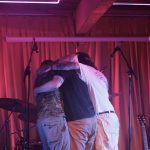Album Review: kristeva by kristeva
The cyclical nature of the world is excruciating. Even as we continue to frame events in terms of “pre-” and “post-COVID,” we overlook the deeper truth: little has fundamentally shifted. Genocide persists across the globe, sometimes hidden from view, other times broadcast in plain sight. Poverty sprawls all around, seemingly more ferocious than ever, as blame is redirected away from those in power and instead filtered through our ideological biases. Meanwhile, the planet steadily approaches catastrophic conditions, with extreme weather increasingly dismissed in favor of profit, whether through corporate bribes or corrupt buyouts.
There’s a significant toll that comes with this reality. We prioritize teaching empathy and understanding to younger generations, yet we fail to reconcile that with a world spiraling in the opposite direction. Hatred festers, targeting people for their orientation, ethnicity, or beliefs, both spiritual and political. These movements aren’t anomalies; they’re symptoms of deeper fractures we’ve failed to address. Much of what we claim to value as a society–justice, equity, compassion–stands in direct conflict with the systems we uphold. Nothing fundamentally changes. Those in power slip further into corruption and cruelty, while those fighting for progress often end up disillusioned, or, worse, absorbed into alternative movements that eventually betray their ideals.
The cycle is relentless: rebellion is met with resistance, progress gets buried in red tape, and sincere hope is reduced to empty slogans and marketable hashtags. We exist in a time where performance replaces purpose, where visibility is mistaken for victory, and where awareness without action has become its own form of quiet surrender.
Experimental rock band kristeva doesn’t just understand this notion, they’ve endured it. Their 2019 debut record, Goliad, served as a stark rallying cry against globally sanctioned apartheid and systematic poverty. It rebelled against a world where every facet of human existence is reduced to profit margins and production quotas, a relentless churn where value isn’t preserved but steadily eroded, replaced by cheaper, faster alternatives in a loop of constant obsolescence that renders our humanity increasingly unsustainable.
To express their grief and fury, the band turned to the past, framing the album around the Goliad massacre during the Texas Revolution. The result was a searing, three-track release that offered no easy relief. Goliad was severe and uncompromising, transforming historical trauma into visceral music. With expansive post-rock dynamics fused with the raw intensity of screamo and experimental metal, kristeva crafted a soundscape as turbulent and unforgiving as the systems it set out to dismantle.
Six years later, the unrest that powered kristeva’s debut hasn’t subsided… it’s intensified, evolving into something larger and more volatile, yet still confined by the very structures it resists. This tension is the beating heart of their new self-titled full-length. This album stretches its runtime to delve deeper into the uneasy blend of bleak optimism, a yearning for transformation shadowed by the creeping suspicion it may never come.
As with Goliad, the band looks to the past to illustrate their vision of recurring anguish. Archival recordings serve as emotional bookends, capturing the hopelessness of both the oppressor and the oppressed. The opening track, “Mitka,” begins with a chilling excerpt from the Jonestown suicide tape, setting the tone with its raw, historical horror. kristeva builds on that unease with sweeping post-rock textures that soar with desperation, tethered to stark, despairing lyrics: “Broken, ruined, shattered, and poor\ Longing for nothing forevermore.”
The album’s closer, “Unfulfillment,” takes a more introspective route. It samples a 1951 conversation between an unnamed patient and famed psychiatrist Dr. Heinz Lehmann, recorded shortly after the woman’s suicide attempt. “I expect to go to Hell–it couldn’t be any worse than it is here,” she says flatly. Her voice haunts the track as the band unfurls bleak imagery in response: “I don’t remember the start\ I spilled open and it all went dark.” It’s a devastating end to a record that dares to stare directly into the void and reflect what stares back.
Yet kristeva is not all bleak and mournful. Instrumental “Strophes IV – VII, rfm” follows “Mitka” with a sincere sense of optimism. Here, the music gently ascends, layering stirring instrumentation that gradually builds both in volume and emotional clarity. It’s a rare moment of uplift, one that doesn’t deny the darkness but dares to move through it. The piece casts a flicker of light on the path ahead, acknowledging the obstacles and uncertainty, yet still pressing forward with quiet resilience.
“The Inside Of The Sun Frozen Solid” follows next, unfolding in two movements that feel like a steady, deliberate ascent along the fraught path previously illuminated. The first half moves with patient rhythms and understated tones, evoking a sense of hesitant incrementalism, a necessary evil for progress where triumphs are measured not in moments, but in decades. “All we love returns to dust\ The sky above opens up and combusts,” the lyrics repeat like a mantra, reflecting on life’s impermanence. Yet rather than despair, the refrain suggests a kind of acceptance, a recognition of natural cycles that aren’t inherently cruel, only inevitable. As the repetition builds, so does the intensity. The combustion referenced in the lyrics begins to manifest in the music itself, a swell of emotion and energy symbolizing the resilience required to continue, even when change moves at a crawl. But that force doesn’t last forever; the piece settles back into more introspective textures, mirroring the uneven and unpredictable terrain that lies ahead.
The second movement continues the climb but is marked by deeper uncertainty and emotional weight. A mournful guitar line echoes over static-laced transmissions before a slow, steady drumbeat emerges, joined by aching guitar lines that seem to stretch from every direction. The vocals return with a new refrain sung with restrained anguish and melodic tension (“We are one face to face with the collision\ And it happens all at once”). It captures the crushing moment of recognition when trauma or reckoning finally breaks through. The titles for both movements encapsulate this emotional paradox: a world burning with injustice and unrest, yet frozen by suppression and systemic inertia. A sun that should radiate revolution instead sits inert, locked in a stillness that feels unnatural… and all the more painful because of it.
“Stiffs” also unfolds in movements, but unlike the divided structure of earlier tracks, it arrives as one unbroken, eleven-minute piece: a continuous swell of brutal realism reflecting the fractured state of the world today. It opens with deliberate, almost meditative guitar strums, each note drawn out with such precision that the movement of the pick across the strings feels like a statement in itself—intentional, weighted, and purposeful. A third of the way through the piece, the lyrics cut in with haunting clarity: “Our screams are now drowned in silent water\ Run right through us with the weight of a thousand nameless slaughters.” The quietness of this moment isn’t peaceful… it’s suffocating, the kind of silence that follows devastation too vast to fully comprehend.
That realization carries directly into the next section, where layered vocals convey both numb detachment and simmering fury: “How do I live with this ghost\ Its closing cold hands round my throat?\ How do I live with this ghost\ Is it the end of this war I’ve provoked?” The repetition mirrors the psychological looping of trauma, questions that demand answers but are met only with more uncertainty. Then comes a third shift: a sudden burst of rhythm, urgent and racing, like a desperate sprint toward transformation… only to collapse almost instantly. The energy fizzles out, symbolizing the way change so often stalls under the weight of resistance, fear, or confusion. It’s a false start, a flash of movement met by inertia.
In the final stretch, the vocals dissolve into something raw and unfiltered, a semi-improvised rant that channels all the suppressed rage simmering beneath the surface. Each line arrives more unhinged, more desperate, as the music beneath builds with patient, explosive tension. It’s less a climax than a controlled detonation, a slow unraveling of fury shaped by restraint. In this outro, “Stiffs” doesn’t just portray atrocity: it embodies the maddening stagnation that so often surrounds it.
An instrumental reckoning unfolds on “Israfel,” named after the Islamic angel tasked with sounding the trumpet on Judgment Day. The harbinger of the world’s end. Not just an end to existence, but to pain, cruelty, and inhuman horror. Following the emotional torrent of “Stiffs,” “Israfel” offers a welcome breath of uncertain ambiance. There’s no clarity in its tones, no promise, but even ambiguity can feel like relief when compared to the familiar brutality of the present. “Unfulfillment” draws its lyrical foundation from the void left in “Israfel”’s wake, searching for meaning, spiritual or otherwise, within the rubble of ruin and dissociation. It questions whether salvation is even possible after so much damage has been done. When the soul has been fractured by exposure to relentless depravity, can it truly be restored? Or are we merely echoing remnants of something we once believed in?
The album’s closing moments return us to the psychiatric interview first heard in the introduction, but now with heightened urgency. A once demure voice is swapped for one that trembles with immediacy, discussing voices that both soothe and provoke, mirroring the conscience of a society that watches endless suffering unfold and still struggles to respond. These voices could be symptoms of illness… or the only sane reaction in an insane world. In telling their story, through noise, grief, and relentless truth, kristeva pushes listeners toward a blunt realization: awareness is no longer enough. The world doesn’t need permission to change. It always had it. The choice now isn’t whether change should happen, but whether we’ll recognize it and be part of what comes next.
kristeva is made up of Sam Atkinson (bass), Chris George (guitar, vocals), Taimir Gore (guitar, vocals), and Walter Porter (drums), and they are joined on this record by guest instrumentalists Erica Lashley (violin), Spender Rider (tenor saxophone), and Jon K (violin). On this record, each musician helps carry the emotional burden of confronting trauma across generations, a continuum of suffering that ties together the cultic devastation of Jim Jones with modern political figures like Donald Trump and Benjamin Netanyahu. The record recognizes that today’s despair echoes that of a century ago, often voiced more plainly by unnamed patients whose anguish still resonates.
In a statement shared on social media, the band expressed their intent to capture the timeless, connective pain that underscores why advocacy against genocide and poverty remains so essential. “We don’t have illusions that we are change makers,” they wrote. “But we do hope that we can provide a space for all of you to write against those tragedies.”
Disillusionment is an easy refuge in times like these where headlines bleed into each other and hope feels like a luxury. kristeva doesn’t deny the need to step back and recover; they just offer gentle encouragement for listeners to keep stepping forward. Because even the smallest act of resistance, of engagement, of witness, is a movement toward reclaiming our shared humanity.
kristeva is available now on all streaming platforms. For updates on new releases and concerts, make sure to follow kristeva on social media.




